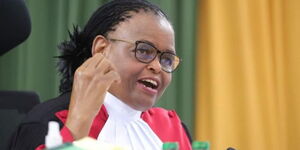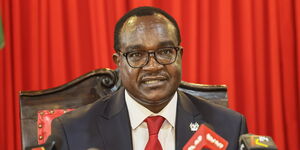A recent debt audit of Kenya's Ksh10 trillion national debt has revealed alarming lapses in the country's loan contracting, appraisals, and negotiations.
The Auditor General's report, released on June 30, exposes significant discrepancies and inefficiencies, raising concerns about the nation's true debt position.
This comes amid legal challenges to President William Ruto’s Public Debt Committee, gazetted last week. The task force is to carry out a comprehensive forensic audit of the country’s public debt and present its report in three months.
Auditor General Nancy Gathungu's investigation highlights glaring inconsistencies in loan transaction records between the Treasury and Project Implementing Agencies.
"The country's true debt position may not be accurately reported," Gathungu remarked, pointing to serious gaps in financial accountability.
The audit evaluated 32 project loans and found that only 18 had feasibility studies justifying their necessity. "Feasibility studies for the remaining 14 project loans were not provided for review," Gathungu stated. This lack of documentation undermines the legitimacy and effectiveness of these projects, risking inefficiencies and wasted resources.
Furthermore, the audit revealed a stark absence of public participation in the planning stages of many projects. Out of the 32 loans, only 10 showed evidence of public participation.
"Lack of public participation by stakeholders and beneficiaries may lead to lack of ownership by the public," the report noted. This deficiency not only jeopardises project support but also their sustainability post-completion.
Approval processes for the loans were equally troubling. Documents for 21 of the 32 project loans were missing, leading to potential double financing and budget overruns.
Only two projects, the Sondu-Miriu Hydropower Project and the Sang'oro Power Plant, provided complete information on loan negotiations.
"There is risk of inadequate understanding and implications of financing terms and conditions across parties of the project loan due to lack of documentation on loan negotiations," Gathungu warned.
Legal oversight was found wanting, with only five project loans backed by legal opinions from the Attorney General. The absence of legal reviews for the remaining loans exposes the government to unfavourable financing terms and potential legal pitfalls.
Gathungu's report underscores the critical need for improved coordination between the Treasury and Project Implementing Agencies. Discrepancies in loan transaction records hinder accurate debt reporting and fiscal transparency.
"To ensure accurate and complete reporting of debt transactions, Treasury and Project Implementing Agencies should collaborate and coordinate in ensuring timely exchange of up-to-date loans transaction information and amounts," Gathungu proposed.
The audit also recommends consolidating all non-principal transactions, such as interest and other fees, to provide a clearer picture of the total cost implications, including those from late payments.
This damning audit calls for immediate reforms to safeguard Kenya's financial integrity and ensure more responsible debt management.












